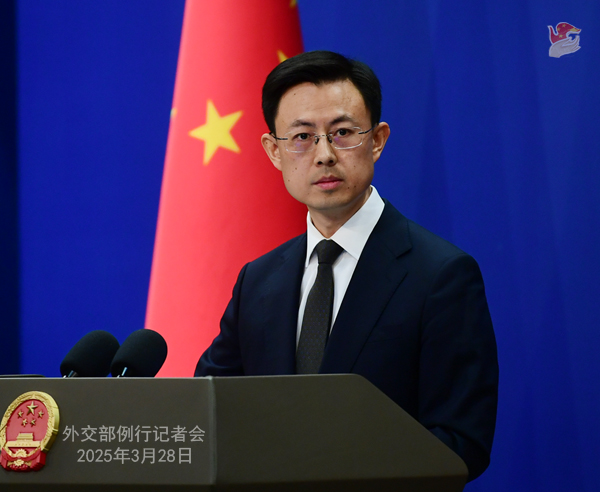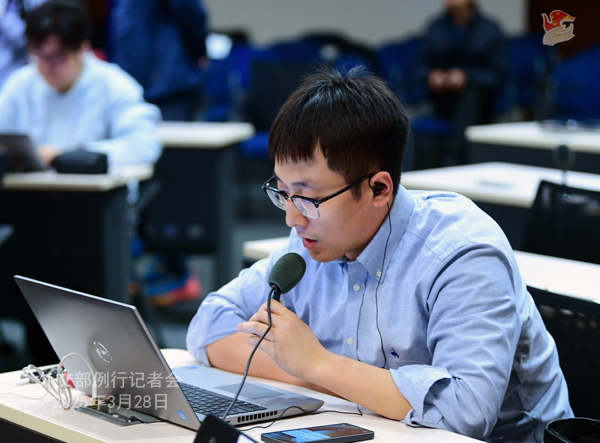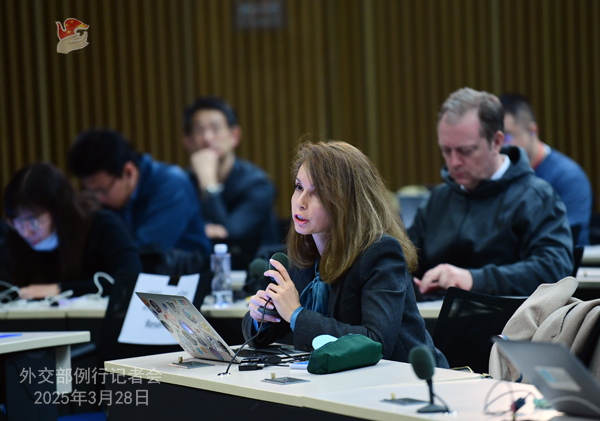
At the invitation of Russian Foreign Minister Sergei Lavrov, Member of the Political Bureau of the CPC Central Committee and Foreign Minister Wang Yi will pay an official visit to Russia from March 31 to April 2.
Beijing Youth Daily: French Minister for Europe and Foreign Affairs Jean-Noël Barrot is visiting China upon invitation from March 27 to 28. Could you share more details, including the important understandings and outcomes reached by the two sides during the visit?
Guo Jiakun: China and France are two permanent members of the UN Security Council and major countries with a spirit of independence. In recent years, under the strategic guidance of the two presidents, bilateral relations have maintained a positive and steady momentum of development. In the current international landscape brimming with changes and turbulence, the two countries maintain close communication and cooperation, which is in the interest of the two countries and conducive to the sound development of China-EU relations and world peace and stability.
China attaches great importance to this visit as this is Foreign Minister Barrot’s first visit to China after he took office and this year opens up the second 60 years of China-France ties. Premier Li Qiang met with him. Foreign Minister Wang Yi and Foreign Minister Barrot had talks and jointly met the press. The two sides had in-depth communication on China-France and China-EU relations as well as international and regional issues of mutual interest. Various mutual understandings were reached.
Both sides shared the view that facing profound changes in the international landscape, as comprehensive strategic partners, China and France need to display a sense of mission, stay committed to multilateralism, dialogue, coordination and mutual benefit, oppose unilateralism, bloc confrontation, decoupling and supply chains disruption, and demonstrate a new sense of commitment in the next 60 years of bilateral relations.
Both sides agreed that they will make the high-level dialogues on strategy, economy and fiance, and cultural and people-to-people exchange a success; deepen cooperation in traditional fields such as agriculture, tap potential for cooperation in innovative industries, including artificial intelligence, encourage two-way investment, and settle trade disputes and open up cooperation prospects through friendly consultation and dialogue; implement the initiative put forward by President Xi Jinping during his visit to France last year, namely bringing the total number of French students in China to more than 10,000, and doubling the number of young Europeans on exchange programs to China in the next three years, further facilitate cross-border travel, and have closer exchanges in culture and other fields; strengthen multilateral coordination, firmly support the UN’s central role, and safeguard the basic norms of international relations based on the purposes and principles of the UN Charter.
The two countries issued a joint statement on climate change. They said that the two sides commit to implementing the Paris Agreement in a comprehensive, complete and effective manner, and strengthening green and low-carbon cooperation. When the global climate governance comes under headwinds, the statement sends a positive message of the joint and firm response by China and France to climate change, which matters a lot to lifting confidence in global climate cooperation and promoting the multilateral process on climate change.
During the visit, the French side reaffirmed their firm commitment to the one-China policy, which China appreciates.
AFP: U.S. defense chief Pete Hegseth is in the Philippines, and today he said that the two countries must stand shoulder to shoulder in the face of the threat represented by China. Does the Foreign Ministry have a comment on this?
Guo Jiakun: Whatever cooperation the U.S. and the Philippines have, it should not target or harm any third party, still less spread accusations about phantom threats to incite confrontation and heighten tensions in the region.
Let me stress that freedom of navigation and overflight has never had any problem in the South China Sea. Throughout the years it’s always been the U.S. who has abetted its allies’ provocations, falsely called China a “threat” and claimed that there’s an issue with “freedom of navigation in the South China Sea”, and kept deploying more and more military resource to the region and undermining its peace and stability. The U.S. needs to get rid of its Cold War mentality, stop creating ideological confrontation, stop sowing tension in the region and discord between its countries, and stop being the disrupter and provocateur in the South China Sea. We also call on the Philippines to stop creating instability with U.S. backing, still less seek military confrontation.

China Review News: On March 27, the UK government released the so-called “six-monthly report on Hong Kong: 1 July to 31 December 2024.” What’s China’s comment?
Guo Jiakun: The UK fabricates the so-called “six-monthly report” to interfere in China’s internal affairs and vilify the human rights conditions and the rule of law in Hong Kong Special Administrative Region. China firmly opposes this. What’s going on is that Hong Kong has entered a new stage in which it has restored order and is set to thrive. Its security, democracy and people’s freedoms and rights are under better protection, and it enjoys more promising prospects for development. Hong Kong shows to the world a safer, freer, and more open and predictable business environment, and sees all-time high figures for the registration of non-Hong Kong firms. Some people should get rid of its deeply entrenched colonial mindset as early as possible, respect China’s sovereignty and Hong Kong’s rule of law, stop pointing fingers at the handling of judicial cases in the Hong Kong, and stop being a haven to the people who sought to destabilize Hong Kong.
Reuters: Is the Foreign Ministry able to provide an update on the safety of Chinese citizens and businesses in Myanmar, Thailand and Bangladesh following the Mandalay earthquake?
Guo Jiakun: We noted relevant reports on the earthquake. We are following and checking the situation, and will release information in a timely manner.
Xinhua News Agency: To follow up on Foreign Minister Wang Yi’s official visit to Russia, can you brief us on the purpose and agenda of the visit?
Guo Jiakun: China and Russia are comprehensive strategic partners of coordination in the new era. In recent years, under the strategic guidance of the presidents of the two countries, China and Russia have upheld lasting good-neighborliness, comprehensive strategic coordination and the spirit of mutual benefit and win-win cooperation. We have deepened back-to-back strategic coordination, expanded practical cooperation across the board and made important contribution to the development and revitalization of the two countries and efforts of safeguarding basic norms governing international relations.
During the visit, Foreign Minister Wang Yi will meet with the leader of Russia and hold talks with Russian Foreign Minister Sergei Lavrov. China hopes to work with Russia through this visit to implement the important common understandings between the two heads of state and have in-depth communication on the future development of China-Russia relations and international and regional issues of mutual interest.
BBC: Just a follow-up on this question about the U.S. Defense Secretary in the Philippines. When he spoke about the perceived threat from China, his words was the threat was from the communist Chinese. What do you think of that language? Does it sound appropriate to the Chinese government?
Guo Jiakun: Let me stress that the leadership of the Communist Party of China (CPC) is the choice of history and the choice of the people. The CPC’s leadership is explicitly stipulated in China’s Constitution and enjoys the wholehearted support of the Chinese people, and this will not be shaken by any force.

RIA Novosti: Russian President Vladimir Putin said earlier that the possibility of introducing temporary governance in Ukraine under the auspices of the UN could be discussed with the United States, European countries, and Russian partners. I wonder what’s China’s comment on this proposal.
Guo Jiakun: China’s position on the Ukraine crisis is consistent and clear.
AFP: A South Korean government source on Friday said that top trade officials from South Korea, Japan and China will meet this weekend in South Korea to discuss economic cooperation. Can the Foreign Ministry confirm this?
Guo Jiakun: I’d refer you to competent authorities for anything specific. China supports the three countries in strengthening trilateral cooperation.
Global Times: We noted that the Cyberspace Administration of China and other authorities jointly issued the measures for identifying AI-generated synthetic content recently. Can you share more information on that and China’s position on the governance of AI?
Guo Jiakun: I’d like to refer you to the competent authorities for anything specific. Let me stress that China puts forward and follows the Global AI Governance Initiative and actively supports the joint efforts from all countries in promoting AI governance. We uphold the principles of a people-centered approach and the development of AI for the good of humanity, put equal emphasis on development and security, advance AI application and governance in a balanced manner and ensure that AI is safe, reliable, controllable and fair. We are committed to implementing risk-oriented and agile governance, gradually establishing and improving laws and regulations and vigorously advancing the sound development and well-regulated application of AI. We will continue to work with all parties to engage in dialogue and cooperation, share the best practices and work to build broader consensus in the global governance of AI.